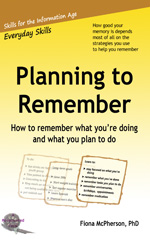Forgetting to do things
- Forgetting future tasks and events is the most common type of memory failure
- Older adults are in general no worse at this type of remembering than younger adults
- Older adults may have more difficulty at remembering to do actions at particular times
- Older adults also need to make more effort in situations when an action cannot be performed immediately, but must be held in memory for a brief period.
The other day I was sitting in the sunshine in my living room going through some journal articles I'd photocopied. I realized I needed to staple the pages together and went down to my study to get the stapler. Approaching my desk, I decided to check my email while I was there. And then, I decided to check my library account online to see whether a book I had requested had turned up. When I'd done that, I went back upstairs to my papers. Where I realized, of course, that I'd forgotten the stapler.
This type of memory failure — going to do something, getting sidetracked, doing something else and forgetting the original task — is familiar to all of us. As are everyday memory failures like forgetting to put the garbage out; forgetting to take medication at the right time; forgetting a dentist appointment (although there's more than one reason for that!).
This type of memory failure — forgetting the future, as it were — is a failure of a type of memory called prospective memory, and it is probably the most common type of memory failure older adults suffer from. And probably the biggest concern.
It's a concern because it's a failure of memory that has consequences, and those consequences are often not only obvious to ourselves, but also to others. Which makes us feel worse, of course.
But it's not just a matter of being embarrassed. Older adults are particularly vulnerable to thoughts that they are "losing" their memory — and the fear of Alzheimer's lurks in all of us.
So, should you be worried if you forget what you're doing?
Like other types of forgetting or absent-mindedness, it depends on the degree of your forgetfulness. But prospective memory failure is common among older adults for a very good reason. Not because it's a precursor of cognitive impairment, but because it's the most common type of memory failure for everyone.
In fact, older adults in general are no worse than anyone else in this particular memory domain, although they may worry about it more (because they worry about any memory failure more).
In some aspects of prospective memory, older adults are actually better than younger adults! One reason for this is that they are more likely to use memory aids — like writing down reminders, or putting reminder objects in strategic places — to help them remember.
However, it does seem that older adults may do less well at remembering things that have to be done at particular times, and one reason for this seems to be that they tend to be poorer at monitoring time. In these cases, it's therefore a good idea to use timers as reminders.
Older adults also seem to have more trouble in the situation when a remembered intention cannot be performed immediately, but must be held in memory for a brief period. Even 5-10 seconds is too long! Tasks that you are "just about" to perform, but in fact are not doing that very second (because you have some other intervening task to do first) are probably particularly dangerous because you don't feel a need to make an effort to remember them (because you are "just about" to do it). But without rehearsal, information falls out of working memory (the stuff we're holding in the conscious "forefront" of our mind) in seconds. So you do need to make an effort. And often, that's all it needs.
You can read more about planning memory strategies in my book on planning memory.
